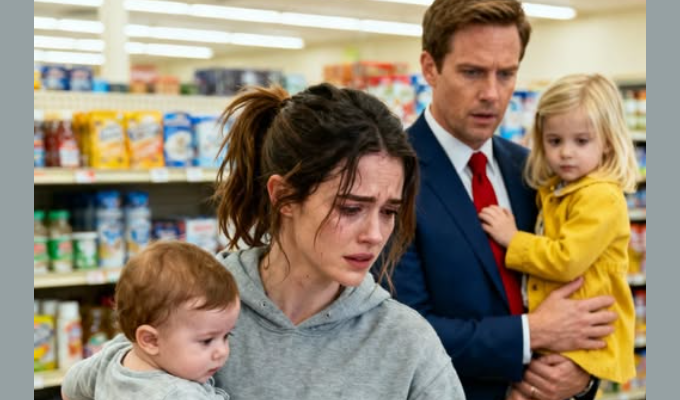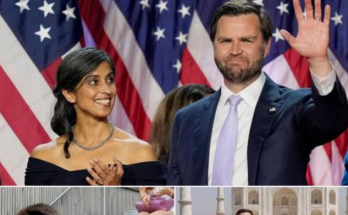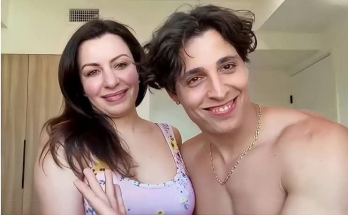Eleanor Vance first noticed the light in the Mega Mart before she noticed anything else—the harsh, humming fluorescence that made everything look a little too sharp, a little too exposed. Under that unforgiving glow, she felt smaller than she already was, as if the light itself were appraising her life and finding it wanting.
She stood in the checkout line clutching her late grandfather’s old leather wallet, the one piece of him she carried everywhere. Inside it were a few wrinkled bills and some change, all of which felt strangely heavier today, as though they already knew they wouldn’t be enough.
She was twenty-seven, a single mother, and the only person who would fight for her daughter in a world that rarely fought back. Daisy was turning one soon—a wide-eyed, impossibly tender little miracle who made the whole world look softer, even when it wasn’t.
Daisy needed a special kind of formula because her digestive system rebelled against anything cheaper. Eleanor had promised herself that no matter how hard things got, no matter what corners she had to cut, she would always find a way to afford it.
But promises, like budgets, sometimes slipped through fingers.
The cashier—Kevin, according to his name tag—scanned her items in a rhythm that felt too fast, too loud. Bread. Oatmeal. Frozen vegetables. Two jars of baby food. And then he picked up the can of formula. The beep sounded like a judgment.
“That’ll be $31.42,” he said.

Eleanor tried not to show the panic tightening her chest. She had counted her money three times. She had hoped, irrationally, for a sale sticker she somehow missed or a discount that would swoop in like a miracle. But miracles belonged to someone else’s life.
“I’m… I’m sorry,” she whispered. “I need to put something back.”
Behind her, a woman sighed loudly. A cart rattled against the linoleum floor. Eleanor’s throat closed. Her fingers trembled as she pushed the formula toward the cashier. “This one,” she said. The words burned as they left her mouth.
She didn’t look at anyone—not the cashier, not the line behind her, not the ceiling humming overhead in its sterile indifference. Shame pressed against her like a physical weight.
A few aisles away, pretending to study a display of organic juices, stood a man who looked out of place in a grocery store. His gray coat was clean and tailored, the kind of garment that didn’t belong near discount cereal or fingerprints on freezer doors. His name was James Caldwell, though most people who knew that name had seen it in newspapers rather than in person. Tech billionaire. Founder of several companies. Widower. Single father. A man who carried power the way others carried their house keys.
Holding his hand was his five-year-old daughter, Sophia—quiet, observant, and attached to his side like a tiny shadow.
Sophia tugged on his sleeve. “Daddy, why does that lady look sad?”
James looked down at her—his whole world condensed into one small human—and then back at Eleanor, whose entire soul was on display in a three-second glance at a grocery bill she couldn’t afford. He felt something shift inside him, something he hadn’t felt in years. Compassion wasn’t the right word; compassion was too neat, too tidy. What he felt was a punch of recognition. Loneliness knew loneliness when it saw it.
He watched Eleanor pay for the rest of her groceries, her shoulders drawn inward, her head bowed. She left the store like someone hoping the world wouldn’t notice her. But James noticed. He couldn’t help it. He didn’t know her name or her story, but he recognized the weight she carried.
After handing Sophia to a trusted security guard near the entrance, he walked quickly back to the checkout lane. He picked up the can of formula she’d abandoned. Then he added a rotisserie chicken, apples, a loaf of fresh bread, and a box of cookies that Sophia insisted were “the best in the world.” He paid in cash, thanked the cashier, and stepped out into the cold evening.
He found her at the far end of the parking lot, sitting alone on a metal bench at the bus stop, staring at nothing. The world around her was vast and indifferent, and she seemed lost inside it.
He approached carefully so as not to startle her.
“Excuse me,” he said softly.
She looked up, startled. Her eyes—startlingly blue—met his with a mixture of confusion and exhaustion.
“I think you forgot this.” He held out the grocery bag with the formula.
She blinked. “I… I didn’t forget it.”
“I know.” His voice gentled. “That’s why I bought it for you.”
A flush rose on her cheeks—embarrassment, pride, fear. “I can’t take that.”
“Please,” he said. “It’s a gift. From one parent to another.”
She hesitated. Pride rose, and with it a tremble in her fingers. But then she thought of Daisy—her tiny body curling in discomfort from the cheaper formula, her cries that lasted hours. Daisy needed this. Pride didn’t matter next to that.
She took the bag.
“Thank you,” she whispered.
James nodded. “Can I give you a ride home?”
Her eyes widened. “Oh—no, no. I couldn’t—”
“It’s cold. And dark. And your bus won’t be here for twenty minutes.” He glanced at the sky. “Let me help. Please.”
Her breath hitched. No one had said “let me help” with that kind of softness in a very long time.
She allowed him to carry her bag, and together they walked toward the sleek gray car waiting nearby. Inside, the warmth enveloped her like a blanket she didn’t know she’d needed. Sophia offered a tiny wave from her car seat.
The ride was quiet but surprisingly comfortable. Eleanor stole occasional glances at James, studying the way he spoke gently to his daughter, the way sadness lived quietly in the corners of his eyes.
At her apartment—a cramped, aging building tucked into a tired neighborhood—he insisted on carrying her groceries upstairs. When she opened the door, Daisy looked up from her playpen and squealed with delight. Eleanor scooped her daughter into her arms, holding her like a tether to the world.
James watched from the doorway, something warm softening his expression.
“She’s perfect,” he said.
That night, after he left, Eleanor stared at the can of formula on her counter for a long time. She didn’t know the man’s last name, didn’t know his world or how far it stretched, but she knew he had changed something inside her.
He had seen her.
Really seen her.
And that made all the difference.
In his mansion high above the city, James couldn’t stop thinking about her either. The image of her sitting alone at the bus stop haunted him—not because she looked broken, but because she looked brave. A bravery he recognized. A bravery he missed in himself.
He asked his head of security, a former FBI agent named David, to discreetly check on her—to make sure she was safe. He wasn’t looking for details, only assurance.
What he got was a revelation.
Her great-grandfather had served with James’s own grandfather in a nearly forgotten war. Sergeant Michael Vance had saved Corporal Thomas Caldwell’s life. His grandfather had died believing he owed that soldier a debt he could never repay.
James realized that fate had handed him a chance his grandfather never got.
He created the Vance Legacy Grant—an educational and living-expense support program for descendants of veterans. No charity. No pity. A legacy repaid.
Eleanor became the first recipient.
She didn’t know it was him.
Not until the night of the reception.
When she walked into the community center, she felt out of place—too plain, too small, too humble. And then she saw him across the room. James in a dark suit, posture quiet but commanding, eyes scanning the crowd until they found hers. Recognition sparked like a match.
The truth hit her all at once.
The man who bought her formula…
was the same man who changed her life.
Outside on a quiet patio, under a sky scattered with stars, he told her the story of their grandfathers—two young soldiers who once saved each other in the mud of a battlefield. A bond forged long before either of them were born.
“It wasn’t charity,” James said. “It was a debt of honor.”
Her tears glistened beneath the patio light.
But their moment was interrupted—by Penelope Covington, a wealthy, calculating board member determined to keep the world neatly arranged according to her liking. And Eleanor, a poor single mother, did not fit.
Penelope launched a quiet campaign to discredit the grant, implying that Eleanor had manipulated James. A board meeting was called. Eleanor walked in terrified but defiant.
She stood. She spoke. She defended her great-grandfather’s name. She defended her own.
James backed her with the truth—with his grandfather’s journal, with military records, with the story Penelope never bothered to ask about.
The vote was unanimous: the grant would not only continue but expand.
Penelope resigned soon after.
And Eleanor walked out of that room standing taller than she ever had in her life.
Two years passed.
Eleanor earned her degree. She moved into a safer home. She became the director of the Vance Legacy Program, helping veteran families rebuild their futures.
James became her partner—slowly, gently, in the way two lonely people grow toward each other with time. Sophia adored Daisy. Daisy followed Sophia everywhere. And James, who once moved through the world with quiet grief, found himself laughing again, breathing again.
On a warm Saturday afternoon, the four of them sat in a park watching the girls play.
Eleanor leaned her head on James’s shoulder.
“I still think about that night in the Mega Mart,” she said softly.
“So do I,” James murmured. “I think about how lost I was. And how meeting you reminded me what real connection looks like.”
She turned to him. He touched her cheek with a tenderness that still startled her.
“You didn’t just rebuild your life,” he said. “You rebuilt mine too.”
A breeze rustled the trees. Children laughed in the distance. The sun dipped low, casting a gentle golden light across the grass.
Their lives—once separate, fragile, and full of struggle—had woven themselves into something whole. Something strong. Something that felt a lot like destiny.
It had all begun with a single act of kindness.
A can of formula.
A debt of honor.
A spark of connection.
Proof, perhaps, that the smallest gestures can echo across generations—and change everything.



